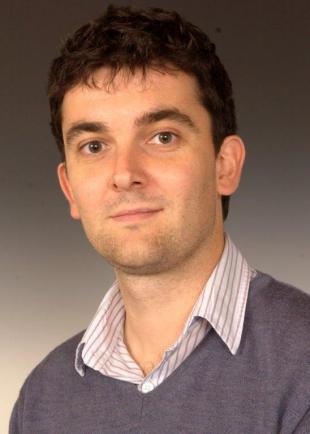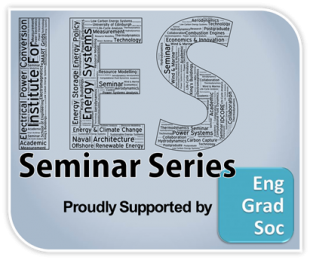Location:
Alrick Building, Classroom 10
Date:
Opening Presentations: New Starts
Introductory Presentations
Damiano D'Aguanno
- Supervisor – Prof. Markus Mueller
- Area of Study: Superconducting Machines for Wind Turbines
Anna Garcia-Teruel
- Supervisor – Dr David Forehand
- Area of Study: Cost and Performance Optimization of Wave Energy Converters
Main Speaker: Dr. Mathieu Lucquiaud, Institute for Energy Systems
Future-proofing thermal power stations with CO2 capture
Abstract
The most important outcome of COP 21 is a global agreement setting a ‘carbon budget ‘, which limits total cumulative emissions to the atmosphere. If and when the ‘budget is spent’, a likely outcome, total net emissions must reduce to zero, by achieving ‘a neutral carbon balance between sources and sinks of greenhouse gases’, another major outcome of COP 21. With Carbon Capture and Storage, carbon dioxide from the use of fossil duels is safely and permanently stored in carefully selected geological formation, several kms below ground level, instead of entering the atmosphere. The technology has a major role to play to decarbonise electricity generation, in a cost effective manner when total system costs are taken into account, and, uniquely, decarbonise carbon intensive heavy industries, such as steelworks, refineries, etc. It can partly address the systemic risk in financial markets, the so-called ‘carbon bubble’, caused by constraining demand for otherwise monetised fossil fuel reserves, and, can also be adapted to remove CO2 from the atmosphere either with biomass-generated electricity, fuels or products, or with direct air capture.
I will give an overview of my current research in developing advanced power plant systems, which facilitate capture-readiness and process intensification, using agile tomography, by increasing CO2 concentration and reducing flue gas flow rates. I will then showcase recent work on pilot scale testing of highly flexible operation of CCS power plants, and options to unlock flexibility within the full CCS chain. Finally, I will discuss new opportunities for collaborative research in derisking in-situ capture technologies at industrial sites with a transportable lab, and in the modelling of the combustion of low-calorific value fuels for applications to heavy industries.
Bio
Mathieu Lucquiaud is a Lecturer in the School of Engineering at the University of Edinburgh, and current holds a Royal Academy of Engineering Research Fellowship (2012-2017) on “Future-proofing Thermal Power Stations with CO2 capture”. He has worked on Carbon Capture and Storage since 2005 at Imperial College, and then at Edinburgh University since 2010. He has recently joined the Institute for Energy Systems.
His research in ‘Thermal Power Plant Engineering applied to Carbon Capture and Storage’, funded by the EPSRC, DECC and industry, is at the interface of mechanical engineering, chemical engineering, combustion, instrumentation and techno-economics and consists of a combination of experimental work, pilot plant scale test campaign, process and power plant system models, in particular steam and gas turbine systems.
He is a member of the Directorate of the Scottish CCS Centre and of the Board of the UK CCS Research Centre PACT (Pilot Scale Advanced Capture Technology) facilities, the UK national facilities for combustion and CCS R&D, where he coordinates activities related to an open access transportable carbon capture lab.




